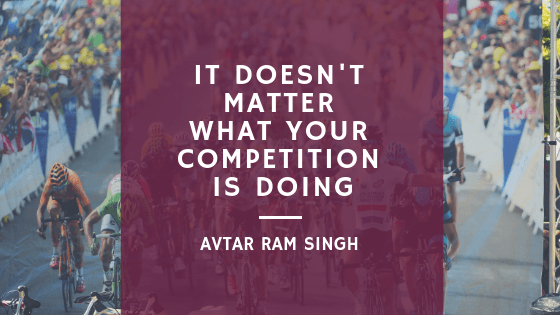
By Avtar Ram Singh, {grow} Contributing Columnist
The title might seem controversial, given that almost all marketing teams are told to study what the competition is doing.
While most marketing teams are adept at tracking and monitoring what their competition is up to, my major concern is that often marketers are too concerned with what the competition is doing, and not WHY they’re doing it.
It might seem like an inconsequential detail to obsess about, but the reality is that it makes all the difference when it comes to your attitude about the marketing you do.
The Fear of Being Left Behind
Many a conversation with marketing leads and teams beginS with what their competition is experimenting with, doing better and seemingly ahead of the curve with. Teams feel threatened by this because they don’t want to play catch up with anyone.
Here are what some of these scenarios look like:
- A competitor has an incredibly well managed and segmented e-mail marketing program with beautifully designed e-mails.
- Another is creating high quality 15 second Facebook videos that are attracting a ton of views.
- A third competitor has a weekly infographic series that breaks down complex industry terms for consumers to better understand the product in the B2B space.
The reaction to these often is to invest in an expensive and robust CRM software to copy what the first competitor is doing, to engage a freelance videographer to help with what the second competitor is doing, and to hire a graphic designer that can help with what the third competitor is doing.
If they’re doing it, we must too, and not be left behind.
The Why of Competition Brings Clarity
Let’s re-look at those three competitors and see what the potential why behind those tactics is.
- A competitor has an incredibly well managed and segmented e-mail marketing program with beautifully designed e-mails: Perhaps management has taken the decision that the digital paid media budget is going to be weaned off over 24 months, and therefore the company should rely a lot more on owned data.
- Another is creating high quality 15 second Facebook videos that are attracting a ton of views: It’s an audience building play. The company is pumping a huge amount of media budget to boost these videos, and is re-targeting people that have watched these videos with tactical conversion-driven advertising.
- A third competitor has a weekly infographic series that breaks down complex industry terms for consumers to better understand the product in the B2B space: This competitor has identified small startups that don’t understand the product / industry well enough as their key clients and are aiming to go for them.
Now it’s highly likely that you don’t have media budget problems and aren’t looking at e-mail as the primary driver of revenue. It’s possible that your audience building strategy doesn’t rely on videos on Facebook, and perhaps you have a high traffic blog that generates tons of organic traffic. And perhaps your target clientele is going to be medium-sized businesses, and you don’t want to target startups.
… so should you just dive straight into what the competition is doing and mimic it?
Setting the Benchmark Higher
Another problem with constantly being paranoid about what the competition is doing is that “beating it” becomes a key objective. But this is a dark hole to go down.
If Competitor A does X, you want to do X. If Competitor B does Y, you want to do Y. If Competitor C does Z, you want to do Z.
The trouble is that A is probably focusing on X, B on Y and C on Z. You on the other hand, are trying to do X, Y and Z – and when your focus is split across multiple avenues, you’ll never do anything better than someone that is doing something with complete focus. You’ll end up with less than ideal versions of X, Y and Z which won’t particularly fulfil any bigger marketing objectives.
Set the benchmark higher.
Keep an eye on your competition, monitor what they’re doing, but keep an eye on your marketing and customer objectives. Only consider activities that help hitting those objectives, and ensure that you only undertake ones that are most efficient and make the most sense for your particular use case.
Everything else is noise.
 Avtar Ram Singh is the Head of Strategy at FALCON Agency, a performance-led, business results oriented marketing agency that operates in South East Asia. He’s built marketing strategies and performance frameworks for brands on global and regional levels, across a variety of industries. You can find him on LinkedIn, and Twitter.
Avtar Ram Singh is the Head of Strategy at FALCON Agency, a performance-led, business results oriented marketing agency that operates in South East Asia. He’s built marketing strategies and performance frameworks for brands on global and regional levels, across a variety of industries. You can find him on LinkedIn, and Twitter.


